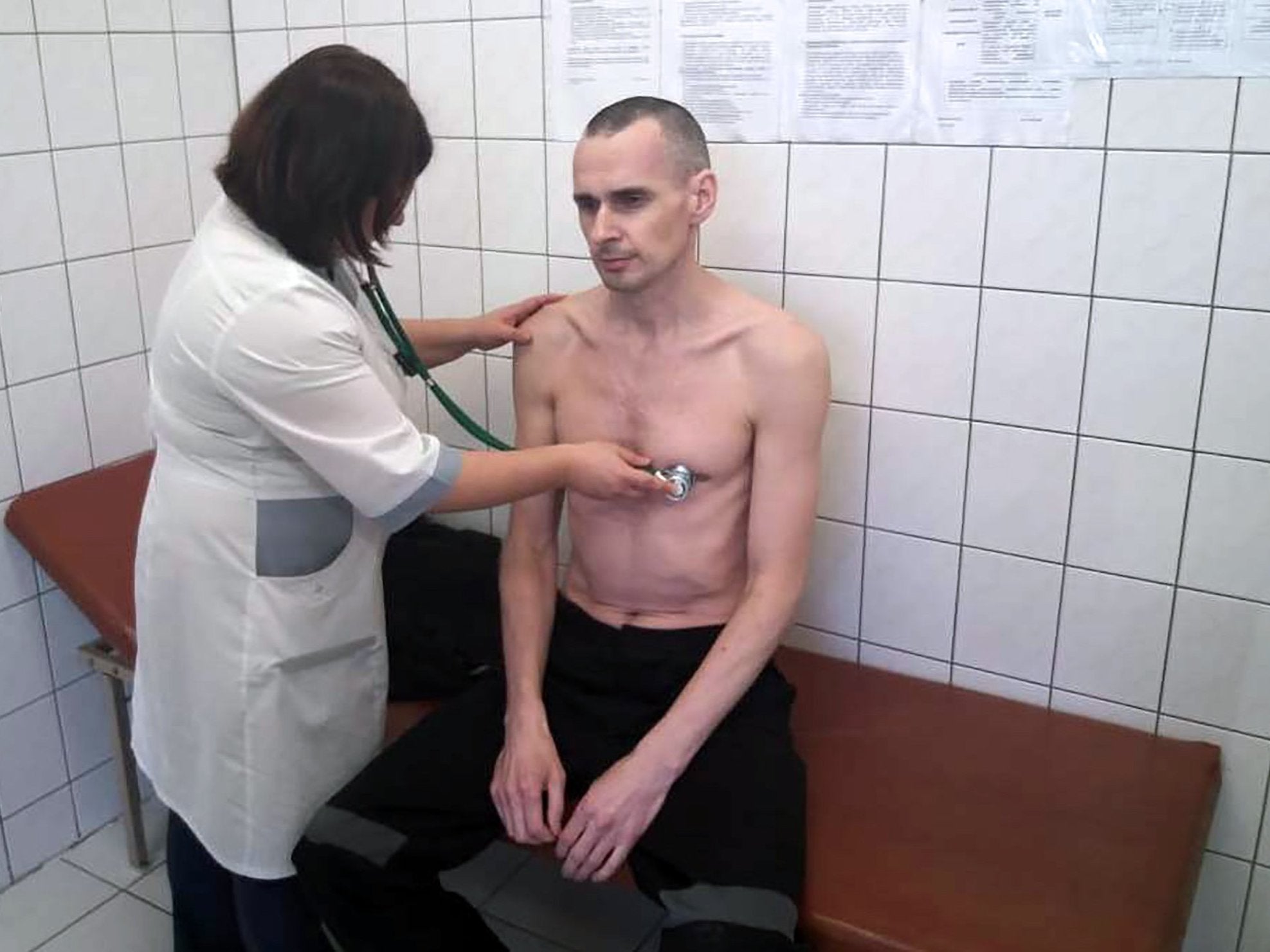Ukrainian filmmaker Oleg Sentsov ends 145-day hunger strike in Russian jail
Director originally hoped to only end his protest once the Kremlin released 64 Ukrainian political prisoners understood to be held in Russia

Your support helps us to tell the story
From reproductive rights to climate change to Big Tech, The Independent is on the ground when the story is developing. Whether it's investigating the financials of Elon Musk's pro-Trump PAC or producing our latest documentary, 'The A Word', which shines a light on the American women fighting for reproductive rights, we know how important it is to parse out the facts from the messaging.
At such a critical moment in US history, we need reporters on the ground. Your donation allows us to keep sending journalists to speak to both sides of the story.
The Independent is trusted by Americans across the entire political spectrum. And unlike many other quality news outlets, we choose not to lock Americans out of our reporting and analysis with paywalls. We believe quality journalism should be available to everyone, paid for by those who can afford it.
Your support makes all the difference.After 145 days, Oleg Sentsov’s lonely protest is coming to an end.
On Friday, the Crimean film director, controversially jailed by Russia on disputed terrorism charges in 2014, said he would be ending his hunger strike effective Saturday. In a handwritten statement released by his lawyer, he said he had been forced to abandon his protest because of the “critical state of his health” and the impending threat of hospitalisation and force-feeding.
“Pathological changes have already started in my vital organs,” the statement reads. “Force-feeding has been planned for me, and I have no say in the matter [...] In the current circumstances I am forced to end my hunger strike.”
Valery Maksimenko, the deputy head of Russia’s prison service, had earlier trailed Mr Sentsov’s announcement with a statement of his own to a state news agency. Mr Sentsov had agreed to eat again, Mr Maksimenko said, after being “persuaded by doctors … to choose life”.
In recent weeks, as his health deteriorated, Mr Sentsov had already moved from a total hunger strike to one that included limited nutritional support, and later glucose drips and small doses of protein shakes.
But the four months of hunger striking have had an obvious effect. A picture released last weekend, taken the previous Friday on his 137th day of fasting, show an obviously aged, pale and emaciated man. Shortly after that photo was released, his laywer, Dmitry Dinze, said his client had been suffering from heart, kidney and liver problems. Mr Sentsov had already refused to be hospitalised a few times, he said.
The film director announced a hunger strike on 14 May, a month before Russia was due to host the World Cup, timing his actions to impart maximum embarrassment for Russia. He said he would end his protest only when the Kremlin released 64 Ukrainian political prisoners understood to be held in Russia.
The ultimatum did not have the desired effect.
Not even an emotional appeal for clemency by Mr Sentsov’s mother was enough to move Russia’s president. Mr Sentsov would need to make the appeal himself, Vladimir Putin retorted, aware that was something that the film director had ruled out. Far from a political prisoner, Mr Sentsov was in fact “a terrorist”.
Mr Sentsov’s arrest and 20-year prison sentence are heavily disputed.
“145 days of battle, 20kg less in weight, body destroyed, and the aim is not achieved. I’m grateful to everyone who supported me, and I ask forgiveness from those I’ve let down”
Russia says the film director and pro-Ukrainian activist was responsible for terrorist attacks on pro-Russian organisations in Crimea and had attempted to blow up the Lenin statue in the capital, Simferopol. For those who knew Mr Sentsov around this time, the accusations did not ring true: he urged people away from violence, one told The Independent.
Mr Sentsov pleaded not guilty to all the charges. There was never any real doubt of the verdict, delivered in 2015: in Russia, over 99 per cent of trials end with the word “guilty”.
His imprisonment was widely condemned by the international community, and Amnesty International declared him a prisoner of conscience.
Ukraine and several European countries have pushed for Mr Sentsov’s release, but in recent weeks, negotiations stalled. Last week, a Russian newspaper suggested that Moscow was trying to extract a high price, asking to exchange the film director for three Russians held in the United States: Victor Bout (held over illegal arms trading), Konstantin Yaroshenko (cocaine smuggling) and Marina Butina (an alleged Russian agent).
The State Department replied curtly. The offer was “senseless” and an “attempt to use the illegal detention of a Ukrainian citizen as a negotiating base”, it said.
In his statement, Mr Sentsov seemed to accept his protest had not quite had the effect he had hoped for.
“145 days of battle, 20kg less in weight, body destroyed, and the aim is not achieved,” he said. “I’m grateful to everyone who supported me, and I ask forgiveness from those I’ve let down.”
Join our commenting forum
Join thought-provoking conversations, follow other Independent readers and see their replies
Comments